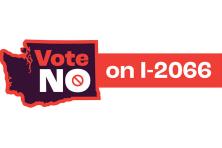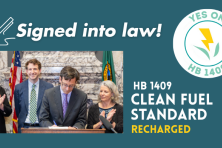You may have heard about the Road Usage Charge as part of a new progressive funding model for Washington State’s transportation system. With the decline of gas tax revenues in our state, it’s critical we look to more stable and consistent sources of revenue to continue to maintain current roads; and create a climate-friendly, affordable, and accessible transportation system. Washington’s not alone in considering a Road Usage Charge, with many states across the country conducting pilots and studies to consider a policy. Happy to provide a more detailed policy memo on the Road Usage Charge if that's of interest, but summarized a few key points below.
Hearing link: https://leg.wa.gov/House/Committees/TR/Pages/default.aspx?eventID=20220…
What is a Road Usage Charge?
- A Road Usage Charge (RUC) is a great way to move beyond the regressive gas tax to a more stable, progressive way to fund our transportation system. It’s a per-mile fee paid by drivers to account for their use of the transportation system and unlike the gas pump, could be designed to account for people’s income.
- The House Transportation Committee is considering HB 2026 today, which would establish a RUC that is mandatory for new electric vehicle drivers and allows vehicle owners to opt in over different phases. Those participating in a RUC would not pay the current state electric-vehicle specific registration fees.
Why does it matter?
- A RUC provides the opportunity to provide unrestricted revenue to holistically fund our transportation system. It also provides an opportunity to make transportation revenue generation more progressive as an income-based rate could be introduced.
- A well-designed RUC will ensure electric vehicles are still significantly cheaper to own and operate while still contributing their share for use of Washington’s roads.
If you tuned in, you might hear the following questions. We would like to proactively provide some answers:
What about rural drivers who drive more?
Answer: Rural drivers already pay for their higher mileage via the gas tax. A gas pump cannot charge based on income, but a Road Usage Charge can. Lower-income people should not be overly burdened by transportation costs, and a progressive rate structure would ensure Washington brings in needed revenue without harming those least able to pay.
EV owners already pay a fee. Why are we going to charge them more?
Answer: The RUC would replace the flat EV fee, with exact costs depending on the individual EV driver. An EV driver who drives the WA average would pay about the same—lower mileage drivers will be better off than paying the flat fee, while high mileage drivers may have to pay a bit more. Either way, EV drivers will maintain massive savings compared to driving a gas vehicle. No one likes potholes, so gas vehicle and EV drivers alike should contribute to road maintenance fairly. RUC aside, we continue to work on policies that make choosing an EV the easier, cheaper option.



